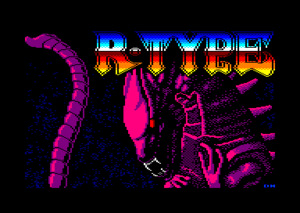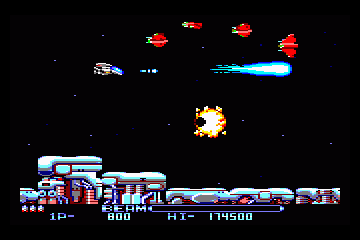R-Type
| |||||||||||||||||||||||||||||||||||||||||||||
R-Type is a classic and cult Shoot'em up ported from the famous IREM's arcade game with the same name, released in 1987.
It was ported on almost every computer of the era and was released on Amstrad CPC in 1988. Despite being good, it remains an case of Speccy Port.
You make one little mistake in your life and the internet will never let you live it down.... Electric Dreams / Activision gave me 21 days to do the port. I wish i had the time to do a nice mode 0 port with new graphics, but alas it was never to be.
Keith A Goodyer at CPCwiki forum, 02/25/2010
The completed Spectrum version - including the source code - was handed over on September 16th 1988 (Activision didn't quite get it that day but that's another story). This was the first day of the PCW show at Earls Court in London and Activision had press releases stating that the release date for this, and for the original Amstrad CPC version, would be November 1988. Keith received the source code the following week and started work immediately on the conversion (after a phone call or two) which means that, allowing for the 21 days it took to complete the conversion, the original CPC version was finished mid October.
Bob Pape at CPCWiki forum, 03/10/2011
Contents
The Fluff
- The mission : defend the human race against the BYDO threat.
- The weapon : the R-9 spacefighter, equiped with "the Force", a fragment of Bydo flesh.
- The game : R-Type.
Blast off and strike the evil Bydo empire!
The Game
Considered nowadays as a classical horizontal shooter, R-Type introduced two revolutionary concepts in gameplay :
- Extra module named "Force" that can be docked on front or behind the player ship.
- Loaded shot named "Beam".When you are loading the Beam , its power grows but you can not shot (except additionnal missiles)
The mastery of theses features is required if you want to master the game itself.
With gorgeous "Gigerish" graphics , unforgeable soundtrack , perfect gameplay and innovative level design , R-Type became a legend of the video game.There are a lot of clones and sequels , and a lot of shooters were (and still are) inspired by this game.
The Port
As said above, R-Type on CPC was a Speccy port.
Yet because the spectrum version was perhaps one of the best in the 8 bit area (and many say the best speccy game ever), the Amstrad version remained playable, fun, yet maybe disappointing and inferior to the Spectrum original:
- Animation is a bit sluggish, lacking the smooth moves and precision.
- Scrolling is a bit cascaded.
- Backgrounds are mono-coloured (a classical Speccy port feature) despite the Mode 1 screen displaying 5 colours
- As usual, a Raster is included, to no effect
- Sprites manage to feature a bit more colours, yet are afflicted by pseudo colour attributes : 8x8 pixels tiles were 1 bit coded, but sprites could feature different inks
- Sprites are not masked either, as unmasked sprites were a trick to avoid Colour Clashes on ZX spectrum
- Thankfully, it still features no colour clashes.
- A code analysis by Arnoldemu showed that double buffer is not used, and screen is located from &0040. &5800 even has attribute data just like on a real spectrum. &7800 has a copy of the attribute data (maybe double buffered so colours can be changed and then updated quickly). Screen is only updated where necessary. it is possible that the same programmer worked on both the Spectrum and Amstrad version, with the process being: start with the Spectrum version, remove some colours because the cpc can only display 4 colours in mode 1 (without using raster tricks), use 90% Spectrum code and convert graphics at runtime into CPC form colouring them as you do this. The result is R-type. This explains why the colours are bad and why the game is so slow.
It is of note that the speccy version was itself ported (graphically) from the Atari ST version.
The good Aspects
As said the Spectrum version was good.
The main reason was because it was so close and faithfull to the Arcade original version.
- In graphics : the fine square pixels (Mode 1) allow fine details.
- In Gameplay : most enemies patterns are closely respected.
As a result, even the humble Amstrad version was very close to the Arcade, at least in gameplay (even sometimes more than the c64 version).
Also the Amstrad version did include good (though sparse) sound effects too. It is also of note that the game is quite big, as it includes the full 8, challenging levels.
Last but not least, the intro screen is in Mode0 and quite nice.
Screenshots
The Cure
Being attribute based animated, R-Type was of course a bit short on 464/664 config (=64K RAM) to get properly recoded in 2bpp graphic data. Yet a 128K RAM version can actually benefit from such true Amstrad CPC graphics and display 4 colours per 8x8 character (mode1) or 16 colours per 4x8 characters (mode0, wider pixels).
However, the single coder who did the port in 3 weeks simply couldn't do that because he had no graphician to re-do the graphics and no 128K version was actually planned.
How it is :
Original Level 2.
How it could be:
Level 2 mock-up, redesigned by MacDeath.
What will be:
Stage 2 map from the 128k version by Easter Egg.
Mode 0 mock-up, courtesy of Carnivac Games.
{{#ev:youtube|C_GDjT1tivo|360}}
Stage 1 video preview (original vs 128k), by Xyphoe.
Game map
- R-Type game map
Longplay videos
source : Youtube.
{{#ev:youtube|t2Vo8dbBJig|300}} {{#ev:youtube|G3UWCzzk2To|300}} {{#ev:youtube|CmnBO8j7IQY|300}} {{#ev:youtube|uxMz7EEDzjQ|300}} {{#ev:youtube|Db2MPcuFwn4|300}} {{#ev:youtube|oGbL5Da9NE8|300}} {{#ev:youtube|arINXwvGdzQ|300}} {{#ev:youtube|biTJY89DT0s|300}}







